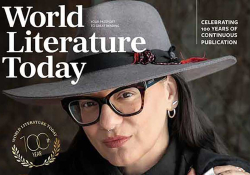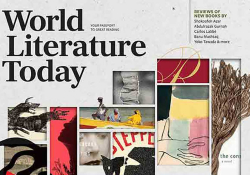Editor’s Note
What I have just written isn’t over. . . . It will never end. It can never end.
—Ananda Devi, La nuit s’ajoute à la nuit

Alongside the aesthetic makeover, WLT’s veteran editorial collective—myself alongside Michelle Johnson, managing and culture editor, and Rob Vollmar, book reviews and online editor—is rededicating itself to bringing readers the best global literary coverage, both in print and online. Notably, the current issue includes marquee features devoted to Neustadt Prize laureate Ananda Devi, Nobel laureate Han Kang, an essay on censorship by recent NSK Prize winner Margarita Engle, and a short story by Sudanese democracy activist and best-selling writer Rania Mamoun, newly translated by Elisabeth Jaquette. From Iceland to Mauritius, from South Korea to Sudan, readers will find themselves crisscrossing the globe in the pages of WLT. A case in point is Immanuel Kim’s essay on reading trends in North Korea—unless you’re planning to travel to Pyongyang anytime soon, chances are you’ll be hard pressed to find better insight into the DPRK literary scene than in the essay that begins on page 8.
The cover feature devoted to Ananda Devi, which starts on page 40, further exemplifies the editorial team’s commitment to excellence. Fabienne Kanor leads off the section with a lyrical tribute to Devi. While placing Devi’s work in the lineage of other francophone writers, Kanor zeroes in on what it means to write from an island like Mauritius or Martinique. “In embracing your island, in inhaling it,” she writes, “you swallowed your island whole.” Yet Jeffrey Zuckerman insists that by reducing Devi to the labels of Mauritian writer, Indian Ocean writer, African writer, francophone writer, feminist writer, or woman writer, we straitjacket her in restrictive categories while simultaneously neglecting to discern the singularity of her achievement. Finally, Julie-Françoise Tolliver argues that Devi’s work pierces every “invisible border,” signifying “exquisite horror and horrendous splendor without resolution, with a finality that remains playfully open.”
That playful openness remains key, even when the stakes are gravely serious. Beyond geography, genre, gender, and language, Devi forces us to rethink our creeds and complacencies, even our complicity, by holding up a mirror to reality that is unflinching, even brutal, in its starkness. Yet she leaves room for readers to enter the story, the poem, where they might find—however fleetingly—brief epiphanies, small moments of beauty, flashes of truth, kreyol crossings. Rather than a single mirror, however, I think of Devi’s work as an archipelago of mirrors, a kaleidoscope of tongues, a concatenation of worlds built up out of the décombres—ruins, wreckage, rubble—of life.
On behalf of everyone at WLT, and with deep gratitude for your unwavering support of our mission, I’d like to thank you, dedicated reader, for helping us further the cause of world literature, ninety-nine years and counting. Throughout 2025, we will be in touch about our centennial plans. In the meantime, we’d love to hear from you.
Daniel Simon








